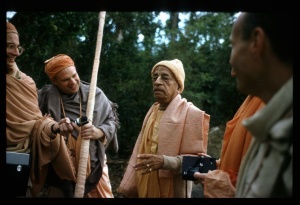SB 7.7.35: Difference between revisions
m (1 revision(s)) |
(Vanibot #0054 edit - transform synonyms into clickable links, which search similar occurrences) |
||
| (One intermediate revision by one other user not shown) | |||
| Line 1: | Line 1: | ||
{{info | {{info | ||
|speaker= | |speaker=Prahlāda Mahārāja | ||
|listener= | |listener=Prahlāda Mahārāja's school friends | ||
}} | }} | ||
[[Category:Srimad-Bhagavatam - Canto 07 Chapter 07]] | |||
[[Category:Bhagavatam Verses Spoken by Prahlada Maharaja - Vanisource|070735]] | |||
<div style="float:left">'''[[Srimad-Bhagavatam]] - [[SB 7|Seventh Canto]] - [[SB 7.7: What Prahlada Learned in the Womb|Chapter 7: What Prahlāda Learned in the Womb]]'''</div> | |||
<div style="float:right">[[File:Go-previous.png|link=SB 7.7.34]] '''[[SB 7.7.34]] - [[SB 7.7.36]]''' [[File:Go-next.png|link=SB 7.7.36]]</div> | |||
{{RandomImage}} | |||
==== TEXT 35 ==== | ==== TEXT 35 ==== | ||
<div | <div class="verse"> | ||
yadā graha-grasta iva kvacid dhasaty | :yadā graha-grasta iva kvacid dhasaty | ||
ākrandate dhyāyati vandate janam | :ākrandate dhyāyati vandate janam | ||
muhuḥ śvasan vakti hare jagat-pate | :muhuḥ śvasan vakti hare jagat-pate | ||
nārāyaṇety ātma-matir gata-trapaḥ | :nārāyaṇety ātma-matir gata-trapaḥ | ||
</div> | </div> | ||
| Line 17: | Line 22: | ||
==== SYNONYMS ==== | ==== SYNONYMS ==== | ||
<div | <div class="synonyms"> | ||
''[//vanipedia.org/wiki/Special:VaniSearch?s=yadā&tab=syno_o&ds=1 yadā]'' — when; ''[//vanipedia.org/wiki/Special:VaniSearch?s=graha&tab=syno_o&ds=1 graha]-[//vanipedia.org/wiki/Special:VaniSearch?s=grastaḥ&tab=syno_o&ds=1 grastaḥ]'' — haunted by a ghost; ''[//vanipedia.org/wiki/Special:VaniSearch?s=iva&tab=syno_o&ds=1 iva]'' — like; ''[//vanipedia.org/wiki/Special:VaniSearch?s=kvacit&tab=syno_o&ds=1 kvacit]'' — sometimes; ''[//vanipedia.org/wiki/Special:VaniSearch?s=hasati&tab=syno_o&ds=1 hasati]'' — laughs; ''[//vanipedia.org/wiki/Special:VaniSearch?s=ākrandate&tab=syno_o&ds=1 ākrandate]'' — cries loudly (remembering the transcendental qualities of the Lord); ''[//vanipedia.org/wiki/Special:VaniSearch?s=dhyāyati&tab=syno_o&ds=1 dhyāyati]'' — meditates; ''[//vanipedia.org/wiki/Special:VaniSearch?s=vandate&tab=syno_o&ds=1 vandate]'' — offers respects; ''[//vanipedia.org/wiki/Special:VaniSearch?s=janam&tab=syno_o&ds=1 janam]'' — to all living entities (thinking all of them to be engaged in the service of the Lord); ''[//vanipedia.org/wiki/Special:VaniSearch?s=muhuḥ&tab=syno_o&ds=1 muhuḥ]'' — constantly; ''[//vanipedia.org/wiki/Special:VaniSearch?s=śvasan&tab=syno_o&ds=1 śvasan]'' — breathing heavily; ''[//vanipedia.org/wiki/Special:VaniSearch?s=vakti&tab=syno_o&ds=1 vakti]'' — he speaks; ''[//vanipedia.org/wiki/Special:VaniSearch?s=hare&tab=syno_o&ds=1 hare]'' — O my Lord; ''[//vanipedia.org/wiki/Special:VaniSearch?s=jagat&tab=syno_o&ds=1 jagat]-[//vanipedia.org/wiki/Special:VaniSearch?s=pate&tab=syno_o&ds=1 pate]'' — O master of the whole world; ''[//vanipedia.org/wiki/Special:VaniSearch?s=nārāyaṇa&tab=syno_o&ds=1 nārāyaṇa]'' — O Lord Nārāyaṇa; ''[//vanipedia.org/wiki/Special:VaniSearch?s=iti&tab=syno_o&ds=1 iti]'' — thus; ''[//vanipedia.org/wiki/Special:VaniSearch?s=ātma&tab=syno_o&ds=1 ātma]-[//vanipedia.org/wiki/Special:VaniSearch?s=matiḥ&tab=syno_o&ds=1 matiḥ]'' — fully absorbed in thoughts of the Supreme Lord; ''[//vanipedia.org/wiki/Special:VaniSearch?s=gata&tab=syno_o&ds=1 gata]-[//vanipedia.org/wiki/Special:VaniSearch?s=trapaḥ&tab=syno_o&ds=1 trapaḥ]'' — without shame. | |||
</div> | </div> | ||
| Line 24: | Line 29: | ||
==== TRANSLATION ==== | ==== TRANSLATION ==== | ||
<div | <div class="translation"> | ||
When a devotee becomes like a person haunted by a ghost, he laughs and very loudly chants about the qualities of the Lord. Sometimes he sits to perform meditation, and he offers respects to every living entity, considering him a devotee of the Lord. Constantly breathing very heavily, he becomes careless of social etiquette and loudly chants like a madman, "Hare Kṛṣṇa, Hare Kṛṣṇa! O my Lord, O master of the universe!" | When a devotee becomes like a person haunted by a ghost, he laughs and very loudly chants about the qualities of the Lord. Sometimes he sits to perform meditation, and he offers respects to every living entity, considering him a devotee of the Lord. Constantly breathing very heavily, he becomes careless of social etiquette and loudly chants like a madman, "Hare Kṛṣṇa, Hare Kṛṣṇa! O my Lord, O master of the universe!" | ||
</div> | </div> | ||
| Line 31: | Line 36: | ||
==== PURPORT ==== | ==== PURPORT ==== | ||
<div | <div class="purport"> | ||
When one chants the holy name of the Lord in ecstasy, not caring for outward social conventions, it is to be understood that he is ātma-mati. In other words, his consciousness is turned toward the Supreme Personality of Godhead. | When one chants the holy name of the Lord in ecstasy, not caring for outward social conventions, it is to be understood that he is ''ātma-mati''. In other words, his consciousness is turned toward the Supreme Personality of Godhead. | ||
</div> | </div> | ||
__NOTOC__ | |||
<div style="float:right; clear:both;">[[File:Go-previous.png|link=SB 7.7.34]] '''[[SB 7.7.34]] - [[SB 7.7.36]]''' [[File:Go-next.png|link=SB 7.7.36]]</div> | |||
__NOTOC__ | |||
__NOEDITSECTION__ | |||
Latest revision as of 23:06, 18 February 2024

A.C. Bhaktivedanta Swami Prabhupada
TEXT 35
- yadā graha-grasta iva kvacid dhasaty
- ākrandate dhyāyati vandate janam
- muhuḥ śvasan vakti hare jagat-pate
- nārāyaṇety ātma-matir gata-trapaḥ
SYNONYMS
yadā — when; graha-grastaḥ — haunted by a ghost; iva — like; kvacit — sometimes; hasati — laughs; ākrandate — cries loudly (remembering the transcendental qualities of the Lord); dhyāyati — meditates; vandate — offers respects; janam — to all living entities (thinking all of them to be engaged in the service of the Lord); muhuḥ — constantly; śvasan — breathing heavily; vakti — he speaks; hare — O my Lord; jagat-pate — O master of the whole world; nārāyaṇa — O Lord Nārāyaṇa; iti — thus; ātma-matiḥ — fully absorbed in thoughts of the Supreme Lord; gata-trapaḥ — without shame.
TRANSLATION
When a devotee becomes like a person haunted by a ghost, he laughs and very loudly chants about the qualities of the Lord. Sometimes he sits to perform meditation, and he offers respects to every living entity, considering him a devotee of the Lord. Constantly breathing very heavily, he becomes careless of social etiquette and loudly chants like a madman, "Hare Kṛṣṇa, Hare Kṛṣṇa! O my Lord, O master of the universe!"
PURPORT
When one chants the holy name of the Lord in ecstasy, not caring for outward social conventions, it is to be understood that he is ātma-mati. In other words, his consciousness is turned toward the Supreme Personality of Godhead.